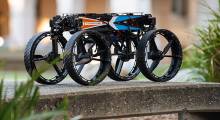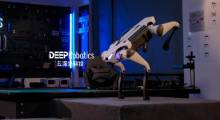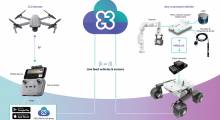Worcester Polytechnic Institute, or WPI, this week said that researcher Markus Nemitz has received a $599,815 CAREER Award from the National Science Foundation to develop an architecture for low-cost custom robots. They are to be capable of traversing challenging terrains by swimming, crawling, climbing, and diving through hostile and confined spaces as part of search-and-rescue operations.
Nemitz, an assistant professor in WPI’s Department of Robotics Engineering, will focus on developing small and flexible 3D-printed robots with integrated fluidic circuits that can be rapidly fabricated for specific disasters. His five-year project will involve testing these robots in a miniaturized model that will be built at WPI.
The NSF-funded project will replicate parts of the Tham Luang cave in Thailand, where flooding trapped 12 members of a youth soccer team and their coach in 2018.
“Disasters often demand unique, specialized responses, such as was required for the Tham Luang cave crisis,” said Nemitz. “There lies immense potential in the development of small robots that are quickly fabricated from soft, flexible materials.”
“These robots can significantly aid rescue efforts by exploring areas that pose potential hazards to humans or are otherwise inaccessible, including earthquake debris, flooded regions, and even nuclear accident sites,” he said.
Research project to advance soft, printable robotics
Nemitz’s project involves making advances in soft robotics and printable robotics, fields that use flexible materials and advanced fabrication techniques. He plans to develop new principles for robot design and fabrication, specifically focusing on integrating electronic circuits with 3D printed fluidic circuits in the robots.
The fluidic circuits will use pulses of air to store programs, process data, and execute simple tasks that control the robots, said WPI. The resilience of fluidic circuits to mechanical damage and electromagnetic interference, combined with traditional electronics, promises to significantly expand the capabilities of the robots, the institute noted.
Design possibilities for these robots are vast, with size variations ranging from as small as a mouse to no bigger than a basketball, according to Nemitz. Using commercial 3D printers and elastomeric filaments, he said he plans to evaluate the robots' feasibility and efficacy by evaluating the time taken to design and fabricate them.
Nemitz will then assess their performance in reaching designated targets within the lab-based model cave.
In addition to the technical aspects of the project, Nemitz intends to develop a hands-on robotics summer camp exclusively for female high school students. This initiative aligns with the plan to launch a new undergraduate course on printable robotics.
Robots to reach places humans cannot
The project builds on Nemitz’s research into soft, programmable robots and promises potential applications to additional fields such as space exploration, climate monitoring, and inspection operations in hostile settings.
“Robots can go to places beyond human reach,” he said. “Equipped with sensors such as microphones and cameras, these robots will enhance the capabilities of rescuers, especially during natural disasters.”
“To ensure a dynamic and rapid response to emergencies, we must continually innovate and develop new technologies,” added Nemitz. “Robotics is at the forefront of this development.”
About WPI
Founded in 1865, Worcester Polytechnic Institute focuses on STEM (science, technology, engineering, and mathematics) research and said it is a global leader in project-based learning. WPI offers more than 70 bachelor’s, master’s, and doctoral degree programs across 18 academic departments in science, engineering, technology, business, the social sciences, and the humanities and arts.
The institute said its faculty and students pursue groundbreaking research to meet ongoing challenges in health and biotechnology; robotics and the Internet of Things (IoT); advanced materials and manufacturing; cyber, data, and security systems; learning science; and more.
Article topics
Email Sign Up
















